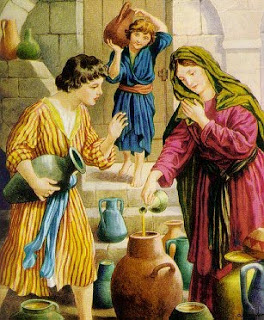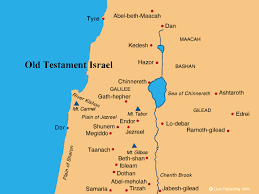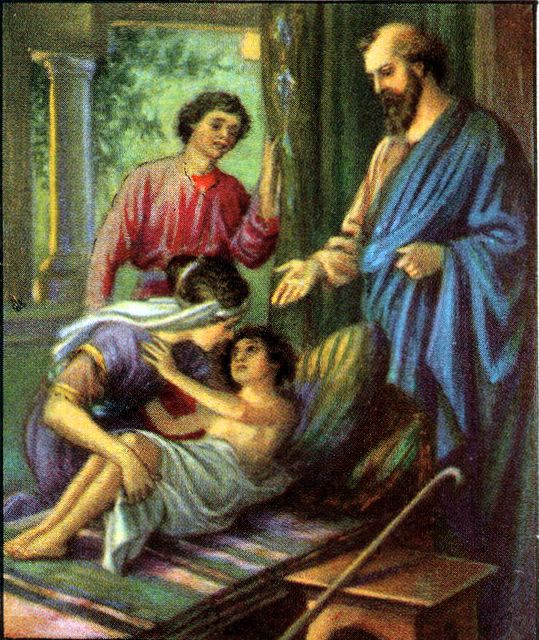Now Elisha spoke to the woman whose son he had restored to life, saying, “Arise and go with your household, and sojourn wherever you can sojourn; for the Lord has called for a famine, and it will even come on the land for seven years.” So the woman arose and did according to the word of the man of God, and she went with her household and sojourned in the land of the Philistines seven years. At the end of seven years, the woman returned from the land of the Philistines; and she went out to appeal to the king for her house and for her field. (II Kings 8:1-3)
The woman from Shunem is one of the most courageous and faithful of the saints whose stories we read of in the Old Testament. The Shunammite woman was displaying kindness and hospitality to God’s prophet at the time – Elisha. Elisha sought to do something for this woman to thank her. When he found out that the woman was childless Elisha promised her that God would bless her with a son. (II Kings 4:16)
What a miracle! How the woman must have rejoiced. She thought that Elisha’s promise was too good to be true. It is easy to compare the woman’s response to Abraham’s wife Sarah’s response when she was told that she would have a child. Sarah wanted to believe but had weak faith. Remember Sarah laughed when she was promised a son. She was very old and past the age of childbearing. God blessed her anyway and she had Isaac at around age 90. (See Genesis, chapters 18-21.) The Shunammite woman was blessed with a son though her husband was very old. Both women knew without a doubt that the praise and glory went to God for their sons.
The Shunammite woman was overjoyed with this blessing from God, but when the boy was older he died, probably of sunstroke. (II Kings 4:18) The Shunammite ran 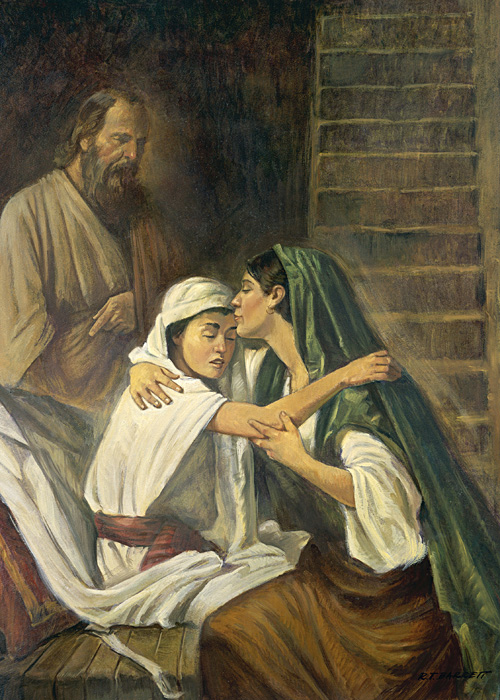 as fast as she could to Elisha and convinced him to come back to her house with her. She had the faith to believe that God would return her child to her. Had the Shunammite woman heard about the son of the widow of Zarephath? Recall that Elisha’s mentor Elijah also raised a boy from the dead. (I Kings 17:17) The miracle of the raising of the widow of Zarephath’s son would have occurred only a few years before this. Would news of that have spread throughout the land of Israel? We do not know, but the Shunammite woman certainly believed that God’s prophet Elisha could raise her son to life. And Elisha did raise the boy from the dead.
as fast as she could to Elisha and convinced him to come back to her house with her. She had the faith to believe that God would return her child to her. Had the Shunammite woman heard about the son of the widow of Zarephath? Recall that Elisha’s mentor Elijah also raised a boy from the dead. (I Kings 17:17) The miracle of the raising of the widow of Zarephath’s son would have occurred only a few years before this. Would news of that have spread throughout the land of Israel? We do not know, but the Shunammite woman certainly believed that God’s prophet Elisha could raise her son to life. And Elisha did raise the boy from the dead.
Things went along well for the happy family in Shunem. But one day God determined to send a seven-year famine on the land of Israel. Elisha was probably still benefitting from the Shunammite woman’s hospitality and repaid her by warning her of the famine. He told her to take her household and go live somewhere else. Two things are evident from the text – her husband had died and the famine was only in Israel. Notice that the prophet told her to take her household and go somewhere else to live for a while. The Shunammite woman was now head of her household. We learned in the earlier story that her husband was very old. (II Kings 4:14) He must have died by this time.
The Shunammite woman went to live in the land of the Philistines. That was not very far away. God was punishing the Israelites for their unfaithfulness again. The famine lasted for the seven years that were predicted.
Then the Shunammite woman returned home. While she was away her home and land had been confiscated. But this plucky woman immediately went to the king to appeal for the return of her property. It was not only for her and her household but was also the inheritance for her son.
God in His gracious providence continued to take care of this woman. Another miracle happened for her. On the very day that she was to go before the king, guess who should have been there before her? It was none other than Gehazi, Elisha’s servant. In God’s providence Gehazi was telling the king the wonderful stories about Elisha.
Now the king was talking with Gehazi, the servant of the man of God, saying, “Please relate to me all the great things that Elisha has done.” As he was relating to the king how he had restored to life the one who was dead, behold, the woman whose son he had restored to life appealed to the king for her house and for her field. And Gehazi said, “My lord, O king, this is the woman and this is her son, whom Elisha restored to life.” When the king asked the woman, she related it to him. So the king appointed for her a certain officer, saying, “Restore all that was hers and all the produce of the field from the day that she left the land even until now.” (II Kings 8:4-6)
The king not only returned her home and lands, but also gave her all of the income from the land from the last seven years! Now she could provide for everyone as well as preserve her son’s birthrite.
The story of the Shunammite woman is amazing from beginning to end. Her life is an example of faithful living. Whether she experienced blessings or trials she exhibited unshakeable trust in God. She also persevered and pressed her claims when she needed to. This woman did not just sit around and whine or complain. While trusting in God she confronted situations head on with courage and forthrightness. She held her own in front of God’s prophet and a king.
The Shunammite woman did not let tragedies keep her from seeking God’s help with true belief in God’s goodness. When her son died, she was able to tell her husband in no uncertain terms, “It is well.” What could she possibly have meant by that other than that she knew God was going to restore her son’s life? She did not back down in front of God’s prophet Elisha. She boldly confronted the king when it came to appealing for her son’s rights. She just did what she had to trusting God for the results.
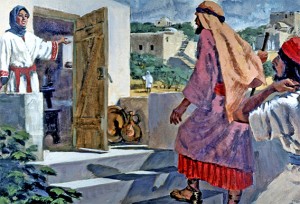 The Shunammite woman teaches us to have the right balance in life. We must trust God but we must persevere for what is right at the same time.
The Shunammite woman teaches us to have the right balance in life. We must trust God but we must persevere for what is right at the same time.
We can also imitate the Shunammite woman by showing hospitality. Hospitality is a spiritual gift. Those who have this gift bless others and are blessed by it. The woman from Shunem practiced this gift her whole life. The Shunammite woman is an example to us of courage, faith and hospitality.
